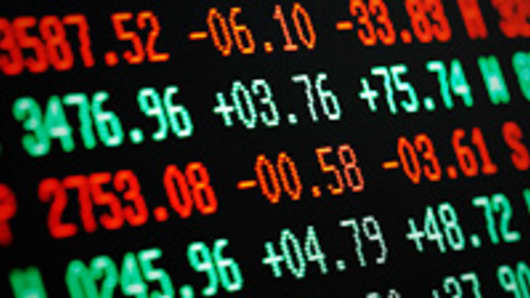The S&P 500 will once again dip in the second quarter of this year but will then soar higher and higher, according to Nomura strategist Bob Janjuah, before hitting a brick wall as the euro zone crisis, "Abenomics" and a changeover at the Federal Reserve come to a head.
In a research note published on Tuesday,the long-term bear who has called the recent rallies for U.S. stocks said he expects another bigger dip for the S&P 500 that will mirror February's turn lower.
"I think we are now beginning or very soon about to begin the next (slightly bigger) dip lower, of 5 percent to 10 percent over [the second quarter], taking the S&P from the 1,575/1550s down to the 1,450/1,475 zone," he said in the note.
The S&P 500 index traded just a quarter point below its all-time closing high on Monday before retreating sharply as the initial euphoria over the Cyprus bailout fizzled, mirroring losses in Europe.
(Read More: Why the S&P 500 Can't Break its Record High)
A "shambolic" policy response to Cyprus,the weakness of the "post-Cyprus" bounce, and comments from the Dutch Finance Minister Dijsselbloem mean that the S&P won't remain above this landmark level for long, Janjuah said.
Market jitters spread on Monday as Dijsselbloem, who is also head of the Euro group, told reporters that the rescue plan for Cyprus could serve as a model for dealing with future banking crises in the euro zone.
Similar comments from the European Commission on Tuesday also managed to curb investor sentiment.
"In the Commission's proposal, which is under discussion, it is not excluded that deposits over 100,000 euros($128,800) could be instruments eligible for bail-in," spokeswoman Chantal Hughes said at a press conference.
(Read More: Cyprus a 'Timely Reminder': Axel Weber)
Despite ongoing Cyprus fears, Junjuauh said that the coming dip will be bought by investors and "celebrated".
"I am fully expecting new all-time nominal highs in, for example, the S&P, into the 1,600s, once it has its first weekly close above 1,575. I think this should occur in [the third quarter]."
This bullishness will reign all the way until the end of the year, according to Janjuah, when it will face increased scrutiny and pressure.
Global growth, especially from emerging markets will likely continue to disappoint, he said, adding that the transition from current Federal Reserve Chairman Ben Bernanke to his successor will likely disrupt proceedings.
The Bank of Japan doubled its inflation target to 2 percent in January and made an open-ended commitment to continue buying assets. This followed a leadership change at the end of 2012, with new Prime Minister Shinzo Abe openly calling for aggressive monetary stimulus from the country's central bank.



